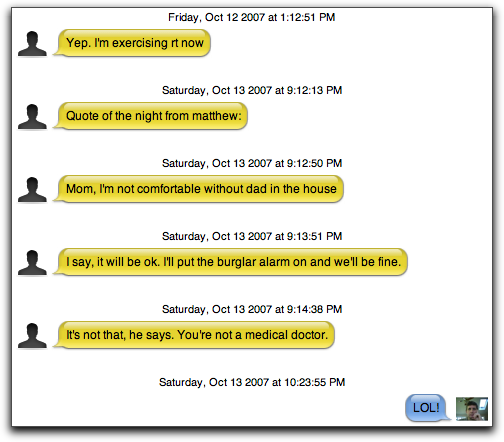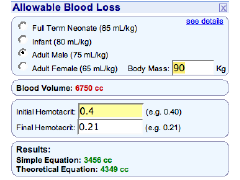Monday, October 15, 2007
At least somebody thinks having a doctor around is good....
-
Printer Friendly|#| Trackback
Micromat, publisher of TechTool Pro (own it!) has released Syphone, an OS X applications which allows you to 'view, save, and backup' SMS messages. This is handy for when you have a particularly funny series of text messages like this:

Thursday, September 27, 2007
Transfer Password Wallet Entries to iPhone
-
Printer Friendly|#| Trackback
I've been a long time user of Password Wallet from Zelznick Scientific Software. A password manager with 448-bit keys, it can launch url's and autofill usernames and passwords. Love it.
This morning they announced the availability of Password Wallet for iPhone. I purchased and installed it right away. It's slick, so I thought I'd post some screenshots. After exporting my selected Password Wallet records to Safari as a bookmarklet, I synced my iPhone with iTunes. I next went to that bookmarklet:
After entering my (correct) password I saw:
Selecting one of the records yielded (username and password erased, of course).
Tuesday, July 31, 2007
Got Aperture, Want To Upload to Picasa? Think Ubermind.
-
Printer Friendly|#| Trackback
I just found a nice plugin for Aperture which automates uploading photos to Google's Picasa Web Album site--Aperture to Picasa Web Albums. My unfrozen caveman anesthesiologist review? Grrr. Upload easy. Good. Grrruh.
Saturday, June 23, 2007
Google Personalized Home Page for Anesthetists
-
Printer Friendly|#| Trackback
I made a tab on my iGoogle page for just my anesthesiology-specific widgets. Take a look...
Saturday, June 9, 2007
Why I'm Not Buying The (First) iPhone
-
Printer Friendly|#| Trackback
With only three weeks to go until the release of the iPhone the frenzy is peaking. What features will it have? What is the twelfth icon? Will it have a SIM tray? Where will be the best place to buy one? I decided to today that I don't care. Let me explain why I won't be buying Apple's iPhone.
I've learned not to buy the first of anything Apple puts out. Though I love the company and have been buying their computers and other devices since the beginning, I think that (especially recently) there's good reason to be patient and let other people help Apple work out the kinks.
I ordered the MacBook on the day it was announced....and had the heat-sink problem. I ordered the 24" iMac the day it was announced...and had it up and die on day four of owning it. There are other examples of released hardware that was flawed initially but improved with each revision that, thankfully, I didn't experience myself. The bottom line is that being first has a price and that it's worth giving Apple a chance to learn from the initial release and improve the hardware with subsequent revisions. That doesn't mean waiting for the next model. Apple revises hardware between new releases, too.
The second reason for waiting is that the device you really wanted is usually the second one in the model line, not the first. But you compromise, tell yourself it's still worth getting the first one, but it's not. Because as soon as the second version comes it, you decide you should have waited. That's what happened to me with the Newton. I bought each new model as it came out (and still have a 2100).
What do I expect in the second version of the iPhone that I think makes it worth waiting for? Better-than-EDGE speed, for one thing. A camera that's better than 2 megapixels for another. GPS for a third. And many fewer problems.
Today, I put down my own good money for a Nokia N95. Five megapixel camera, built-in GPS, and a mature OS that has lots and lots of third-party apps. With iSync and the release of Nokia Media Transport yesterday (nice write-up here), adding contacts, calendars, iTunes music, photos, and videos just got a lot simpler.
ReaderMini: Google Reader On-The-Go
-
Printer Friendly|#| Trackback
I track about one hundred news sources with Google Reader. By subscribing to a site's RSS feed, I can see updates as they happen without having to visit the web page itself. Very efficient.
Google has a mobile version, too. Thought this stripped-down version is excellent for cell phones, the interface is too simple for someone with a more capable internet device such as a PDA, UMPC, smartphone, or Nokia N800 internet tablet.
From reading the forums at internettablettalk.com I just found ReaderMini:
"Reader Mini is a light-weight alternative to Google Reader. Reader Mini uses the Google Reader API to access your feeds. It is a compromise somewhere between the power of the main interface and the too-limited mobile version."
Monday, April 2, 2007
Skim for OS X
-
Printer Friendly|#| Trackback
A new application called Skim has been released for Mac OS X and I mention it here for readers who stuff their hard disks with pdf files of articles they have heretofore been unable to annotate electronically:
"Skim is a PDF Reader and note-taker for OS X. Skim is designed to help you read and annotate scientific papers in PDF."
[Michael McCracken]
Friday, March 9, 2007
Lifehacker: Gmail Manager
-
Printer Friendly|#| Trackback
Download of the Day: Gmail Manager (Firefox) - Lifehacker
" The Gmail Manager Firefox add-on obviates the need to keep your Gmail open in a tab all the time by displaying your email info in a statusbar pop-up, as shown."
A must-have for a Firefox Gmail user
Friday, June 9, 2006
Two Google Firefox Extension: Browser Sync and Notebook
-
Printer Friendly|#| Trackback
Let's say you're like me use hospital computers a great deal. There are some neat tools you should know about to make hospital computers feel more like home. Here are my suggestions:
1. Use a USB thumb drive and install Portable Firefox.
Every hospital computer I've ever used has Internet Explorer as the default browser (sigh). Most don't allow you to install your own software. Having a USB thumb drive with your own lean, mean, pop-up blocking copy of Firefox gives you the browser preferred by nine out of ten dweebs. Any extensions you install are on the USB drive and travel with you. Lifehacker has a nice article on this. Speaking of extensions...
2. If you haven't already done so, get a Google account.
3. Install the Google Browser Sync Extension for Firefox.
I may get around when it comes to using lots of computers, but I do have a first love--my Apple MacBook. (The mooing sounds it makes are just so endearing). And that's where I spend most of my computer time and subsequently have the best organized set of bookmarks. The Browser Sync Extension synchronizes bookmarks, history, persistent cookies, and saved passwords between computers. For more on the security implications, see Lifehacker...
4. Install the Google Notebook Extension for Firefox.
I will occasionally find web content when I'm at the hospital that I want to look at when I get back home. The Notebook extension adds an additional contextual menu option to 'Note This...' which adds the page title, URL, and selected text to my Google Notebook where I can read it later.
5. Set up your Google Home Page and add the Body Mass Index and Allowable Blood Loss modules!
Tuesday, April 11, 2006
Two New Google Modules
-
Printer Friendly|#| Trackback
Seth Dillingham and I have created two modules for the Google personalized home page : Allowable Blood Loss and BMI Calculator. Despite having been submitted a week ago they are still not included in their directory, but I thought it safe to post about them here....
 |
BMI calculates the Body Mass Index using the US or metric system. Furthermore, it can be used to convert from one system to the other.

|
 |
The Allowable Blood Loss Calculator gives a fairly good estimate of how much blood a patient would have to lose to cause a drop in hematrocrit to a specified amount assuming euvolemia is maintained.

|
Thursday, December 1, 2005
Greg Pierce: Pragmatic Security
-
Printer Friendly|#| Trackback
Greg's "Pragmatic Security," for the Rest of You ;-):
" Greg has just published a very pragmatic set of instructions to help "friends and family of geeks" deal with security issues on the internet. Very good recommendations, all of them, and so I'd like to ask all of my friends and family to go check them out. He obviously spent a lot of time writing that essay, and I believe that most will find it an 'easy read'.
He admits it's not a complete solution to everyone. It's a plan to get started. I think it's a good plan.
The most important issue he left out, in my opinion, is the huge number of "phishing" email messages being sent out these days (these are attempts to trick you out of your username and password). Nobody is safe from these, many of them are just too good. I wrote up a little blurb and posted it in a reply to Greg's message, so please include it in your reading. "
[Via Truer Words - A Journal]
| |
1 |
2 |
3 |
4 |
5 |
6 |
| 7 |
8 |
9 |
10 |
11 |
12 |
13 |
| 14 |
15 |
16 |
17 |
18 |
19 |
20 |
| 21 |
22 |
23 |
24 |
25 |
26 |
27 |
|
28
|
29 |
30 |
31 |
|
|
Sep Nov
|


